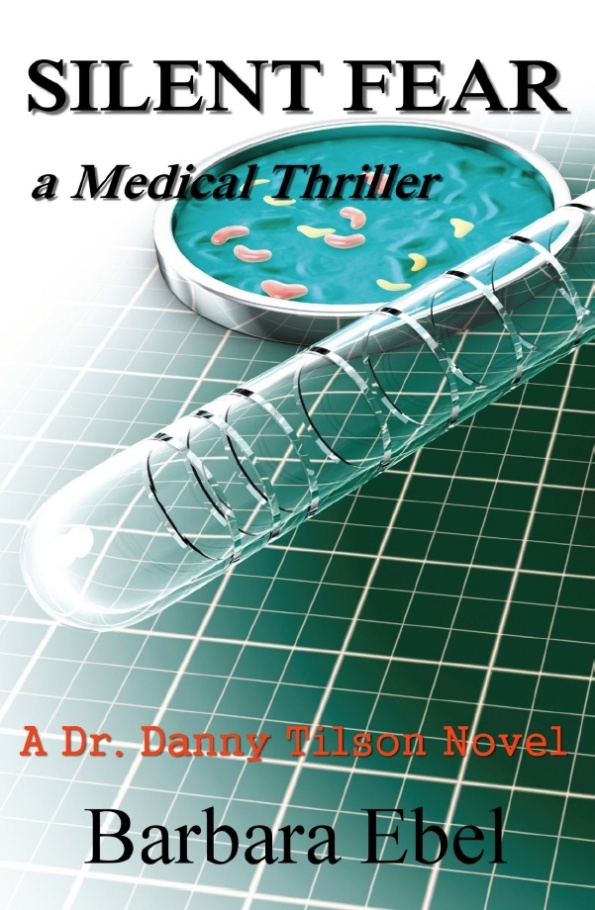Archive
Silent Fear by Barbara Ebel
Whenever you look at the New York Best Seller List or, indeed, any of the comparable lists, the genre that always seems to be the most popular is the thrillers. Perhaps it’s no coincidence that the top-rated films and television series also tend to have a thriller element. This is slightly surprising because, as a subgenre, it’s actually quite difficult to define. As you should recognise, it shares elements with other genres, e.g. mystery, adventure, suspense, romance, and so on. So we need to start with a clear definitional stance. Thrillers are not a subset of mysteries. This is not to deny the possibility of a problem or puzzle for the protagonist to solve, but the primary intention of the thriller author is to thrill the reader not to present a problem for the reader to try to solve. Let’s take House as an example of this definitional problem. This is a medical drama or medical mystery series starring Hugh Laurie as the Sherlock Holmes of the doctoring world. There wasn’t nothing he couldn’t diagnose, no matter how weird or unlikely. All he had to do was ignore what everyone else said and, having eliminated the obvious, he was left with the right answer.
I confess I’m somewhat uncomfortable in classifying the series as “mystery” because that suggests we viewers could also solve the “crime”. Yet, to put it mildly, the majority of the diseases and disorders paraded in front of us each week were esoteric and unlikely. Almost none of the viewers would have the expertise to be able to put the symptoms together to produce a definitive diagnosis. The point of the show is to admire a Brit actor able to limp like he meant it and do a not unconvincing American accent while spouting jargon we can’t understand. There’s no chase scenes or violence in the series so, at best, it’s a drama. If there’s any villainy or conspiracies on display, they are not the type that constitute thriller plot elements. House and Elementary are about watching a man think. There’s little action or suspense.
So if we’re presented with a book labelled medical thriller, what should we expect? If it was a mystery, we would be looking to identify Typhoid Mary to save the community from a major outbreak of whatever disease. Our doctor as detective is looking for medical clues to identify the suspects. When the doctor saves the community, it’s both intellectually and emotionally satisfying. An example of this is Contagion except it doesn’t really stand up as even “exciting” let alone thrilling. For the plot to be a thriller, the doctor would have to be kidnapped and forced to work on a cure, knowing he will be killed if his patient dies. Yes we need a mass of credible medical input to provide the frame of the story, and the resolution must depend on the protagonist using his or her expertise to rescue himself and others from danger. But the dynamic to drive the narrative must be a conflict between the hero and a villain — the paradigm is good versus evil in a high-stakes plot with non-stop action and plot twists that surprise and excite. Adding that extra frisson, the setting should be potentially or actually exotic as we build to an adrenalin-fueled climax. So to match the label on the front jacket, we’re looking for authors like Robin Cook, Michael Crichton or F Paul Wilson. In the cinema, a silly example of the plot is The Viral Factor which has more bullets flying and bombs exploding than I’ve had hot dinners.
Silent Fear (2014) by Barbara Ebel is the second novel to feature Dr Danny Tilson and we’re off and running with two separate households. When Danny’s marriage was breaking down, he had a brief affair with one of the nurses at the hospital where he works as a neurosurgeon. That has produced a baby daughter. They are no longer a couple, and she and the baby have moved in with a pharmacist. Although Danny is not reconciled with his ex-wife, the relationship is as good as it can be, better with their children. So the dynamic for the plot comes from a slow build-up of indicators at Danny’s hospital. There are a couple of patients who have been through surgery but their recovery is slow. Now one of the doctors, two of the nurses and an anaesthesiologist are in trouble. When Danny does an MRI scan of the doctor’s head, the diagnosis is meningoencephalitis. From this ground zero, we get into epidemic levels of transmission. Under normal circumstances, this would not have involved Danny. His medical skills are more the cut-holes-in-skull-and-prod-the-brain-with-sharp-knives league, not the beat-the-bacteria-or–virus-or-whatever–the-source-of-the-infection-is-over-the-head variety of researcher. But he’s important because everyone other than the reader has to guess why he too has not fallen prey to this highly infectious disease with an alarming mortality rate.
As a theme, I’m reminded of the Andromeda Strain by Michael Crichton in which the researchers have to work out why there are two survivors in the town where everyone else has died. Danny had an almost identical pattern of exposure to the others who have sickened, yet he remains disgustingly healthy. Unlike the Andromeda Strain which only someone with a medical background could have “guessed”, I thought the reason was obvious — unlikely since this is not classified as science fiction, but obvious. This does not distract from the methodical science of proving the suspicion correct, nor the general good work of the CDC described in loving detail. Overall, the plot has much to commend it even though the FDA’s reaction is convenient. That said, the subplot involving Danny’s baby daughter is somewhat distracting. Although it’s moving the general character arcs forward, it pales in significance to the outbreak of disease and does not get quite the attention it deserves. The abuse of children, no matter what their age, is not something that should be relegated to occasional mentions as the broader plot progresses. Silent Fear would have been improved either by omitting this element, or giving it due prominence with a full discussion of how to respond. Nevertheless, it remains an interesting medical “drama” novel. A thriller it is not.
A copy of this book was sent to me for review.
Random Posts
Tag Cloud
adventure Agatha Christie Aidan Quinn alternate history anthology Arthur Conan Doyle Books collection detective fiction Elementary espionage fantasy historical fiction horror Japan Jon Michael Hill Jonny Lee Miller kidnapping Korea Korean drama Lucy Liu magic metafiction military fiction Minotaur Books murder mystery Permanent Press PI novels police procedural political thriller romance sageuk science fiction semiotics Sherlock Holmes steampunk Subterranean Press supernatural thriller time travel unreliable narrator urban fantasy vampires zombiesCategories
Archives
- December 2014
- November 2014
- October 2014
- September 2014
- August 2014
- July 2014
- June 2014
- May 2014
- April 2014
- March 2014
- February 2014
- January 2014
- December 2013
- November 2013
- October 2013
- September 2013
- August 2013
- July 2013
- June 2013
- May 2013
- April 2013
- March 2013
- February 2013
- January 2013
- December 2012
- November 2012
- October 2012
- September 2012
- August 2012
- July 2012
- June 2012
- May 2012
- April 2012
- March 2012
- February 2012
- January 2012
- December 2011
- November 2011
- October 2011
- September 2011
- August 2011
- July 2011
- June 2011
- May 2011
- April 2011
- March 2011
- February 2011
- January 2011
- December 2010
- November 2010
- October 2010
- September 2010
- August 2010
- July 2010
- June 2010
- May 2010
- April 2010
- March 2010
- January 2010
- September 2009
- August 2009
- July 2009
- June 2009

